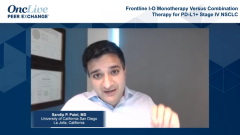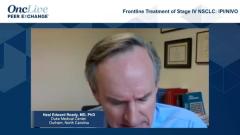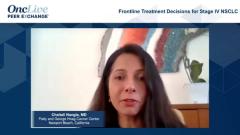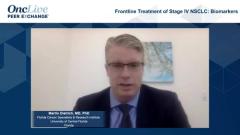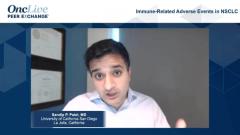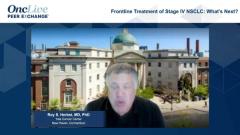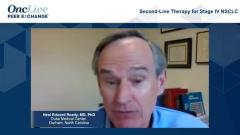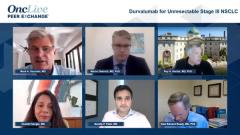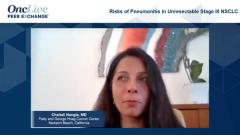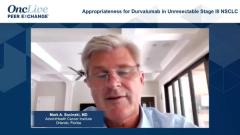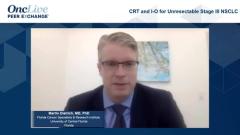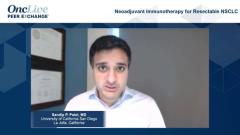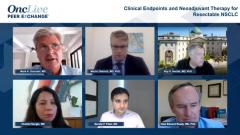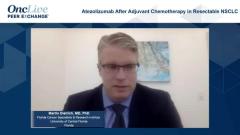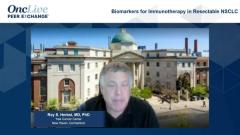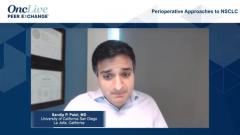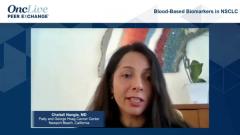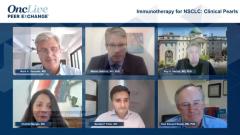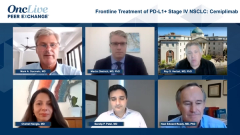
Perioperative Approaches to NSCLC
Drs Chaitali Nangia and Sandip P. Patel debate between best treatment approaches for patients with non–small cell lung cancer in the perioperative setting.
Episodes in this series

Mark A. Socinski, MD: I’m going to go to our Southern California colleagues and ask them about the best approach in the preoperative time period. The question is about neoadjuvant alone, adjuvant, and the arguments for both. What’s the best strategy? Is it the chemotherapy–I/O [immuno-oncology] strategy vs I/O alone? What are your thoughts? I’ll start with Sandip.
Sandip P. Patel, MD: It’s a great question, and tumor boards are about to get even more interesting. But a neoadjuvant strategy necessitates a multidisciplinary evaluation of a patient. Because if you’re in a practice environment, in which you don’t even know a patient is a candidate for neoadjuvant therapy because you see them only after the surgery, then you have 1 choice. It’s adjuvant therapy. A lot of surgery is done in that setting. For those of us who’ve had the opportunity to participate in multidisciplinary discussions, to use neoadjuvant chemoimmunotherapy, my general sense—at least with the current time—is a combination of chemotherapy plus immunotherapy in the neoadjuvant setting would be preferred, even if you’re going to take the IMpower010 approach. You’re going to be given 4 cycles of chemotherapy followed by atezolizumab for a year. We’re not at a juncture in the locally advanced localized setting to do away chemotherapy.
For patients who are stage III, or would require pneumonectomy, or would have a very difficult surgery, at tumor boards, those patients will be considered for neoadjuvant chemotherapy–I/O. The ability to make the surgery easier for the surgeon: convert pneumonectomy to lobectomy, sterilize some of the occult-positive lymph nodes that may be in the mediastinum. For the higher-stage patients—stage IIIA, those questionable stage IIBs that may be IIIAs once you go to the OR [operating room]—a neoadjuvant chemotherapy–I/O approach may be preferred. But there may be patients for whom the mediastinum is completely negative—stage IB, stage IIA—and it’s going to be a lobectomy. It’s going to be relatively easy for the surgeon based on the tumor size due to resection. Those are patients who have the opportunity for neoadjuvant vs adjuvant therapy. That’s where the discussions will likely lie.
One of the things about neoadjuvant therapy, at least the way it’s built, is that we don’t even have survival data. It’s 3 cycles in your adjuvant therapy, and then you’re done. We don’t know what to do if the patient doesn’t get a complete response. Are we going to be doing a year of adjuvant therapy if they have only 20% tumor eradication? These are questions breast oncologists deal with all the time because they’ve been doing neoadjuvant therapy for a long time. In short, things are going to get more complicated before they get less complicated. The general premise is that a patient who requires a more aggressive surgery pneumonectomy and is likely to have positive nodes may have a preferred benefit for neoadjuvant chemoimmunotherapy. It’s probably 1 of the approaches we’ll take at our institutions, seeing how we handle the clinical trials.
Mark A. Socinski, MD: To complicate that argument a little, those exact patients may be the best candidates for chemotherapy radiotherapy strategies with I/O. You’re exactly right: It’s going to get more complicated. Many of the questions in this setting we may have to answer all over again because the historical data may not be pertinent. Chaitali, your thoughts? Do you agree with your Southern California colleague?
Chaitali Nangia, MD: I do. One more important factor is your PD-1 status. What are your molecular drivers? If your PD-1 is deeper, is that patient best on neoadjuvant or adjuvant? That needs to be factored in.
If they can work this into an adaptive strategythat could really push the neoadjuvant approach more.
TRANSCRIPT EDITED FOR CLARITY


